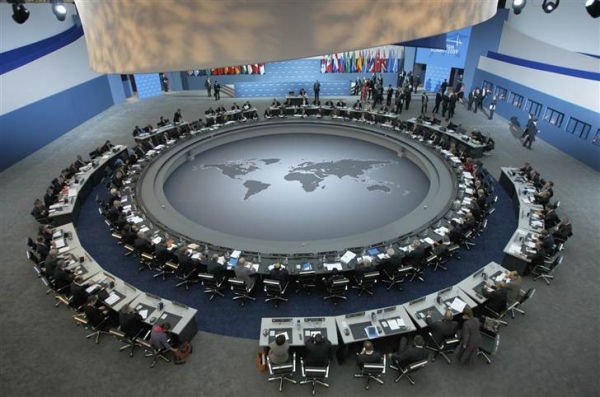Welcome to Around the World! This week we feature discussions on the future of work, public diplomacy disasters, and more!
 | #2050Jobs: The Future of Human Capital The world is facing an employment crisis. Almost 200 million people around the world are unemployed, yet companies can't find workers to fill open positions. Diplomatic Courier and STEMconnector presented a high-level discussion, "Talent Mobility and the Future of Jobs", as we look to the year 2050. Read more about it here. |
 | Vedrine and Kinkel Visit Sarajevo: The Makings of a Public Diplomacy Disaster All happy speeches are alike. All unhappy speeches are different in their own particular way. Read more about an example of diplomatic speech disaster here. |
 | Drones in Our World, Part VI: Barriers to Adoption Amazon will not be able to deliver packages by drone until a policy framework and aviation infrastructure for a sky filled with Unmanned Aerial Systems is built. Read more about it here. |
 | Recovering from a Crisis of Global Governance As the world still struggles with the aftershocks of a global financial crisis and a global rise of protests, it is ever more apparent that global leaders are struggling to deal with effectively addressing the numerous crises coming from all directions. Thierry de Montbrial argues that this is a systemic problem, brought about by weak systems. Read more about it here. |
 | The Skills Initiative of the German Embassy in Washington Many U.S. administration officials, business representatives, state governments, and experts view the German dual system of vocational training, with its distinct notion of cooperation, as a viable model for success in closing the skills gap. With this in mind, HE Peter Ammon, Ambassador of Germany to the U.S., writes about the German Embassy's launch of the Skills Initiative. Read more about it here. |
 | 21st Century Diplomacy: Ballet, Ballots, and Bullets On grounds once walked by George Washington, Diplomatic Courier and the Muscarelle host the forthcoming “21st Century Diplomacy: Ballet, Ballots, and Bullets” photography exhibit, opening to the public on February 7, 2014. Art Director Aaron H. De Groft, Ph.D. to discusses his career and the work of the Muscarelle here. |
Around the Web
Iraqi security forces are preparing to storm Fallujah and break a month-long standoff with militants who control the city, Reuters reports. According to Reuters, "the governor of Anbar had sent a 'final warning' to militants and tribal fighters in Fallujah. Whoever wanted to leave the city would be given safe passage and those who lay down their arms will be offered amnesty." Military forces began an assault on other militant strongholds in the Anbar Province on Sunday, but largely stayed out of Fallujah, fearing massive civilian casualties and re-igniting sectarian conflict in the region.
Afghanistan kicked off campaign season for its presidential elections yesterday, and the stakes are high for this election. Not only will the winner succeed President Hamid Karzai and oversee the final stage of the ISAF mission, it will also be the first independent vote organized by Afghanistan without direct foreign assistance. The process will be a test of Afghanistan's ability to ensure a peaceful transition and stand on its own without U.S. assistance. “If the result is so contested that the new government lacks all legitimacy and authority, if the election is so manifestly rigged and corrupt that it destroys the willingness of the U.S. ... to go on funding Afghanistan, then indeed you can see the setup that we have created going to pieces,” Anatol Lieven, a professor in the war studies department at King’s College London, told The Associated Press.
This Week in History
1917: The United States breaks off diplomatic relations with Germany, which had announced a policy of unrestricted submarine warfare. It was the first of many steps to the U.S.'s entry into World War I.
1943: Nazi forces from the Battle of Stalingrad surrender to the Soviet Union. After a brutal 5-month seige, only 107,800 of the 330,000 first attacking Germans survived the offensive; of those, only 6000 ever returned home to Germany. While considered a major victory for the Soviet Union and a turning point in World War II, the battle cost the lives of 478,741 Soviet soldiers and 40,000 civilians.


a global affairs media network
Around the World!

February 3, 2014
Welcome to Around the World! This week we feature discussions on the future of work, public diplomacy disasters, and more!
 | #2050Jobs: The Future of Human Capital The world is facing an employment crisis. Almost 200 million people around the world are unemployed, yet companies can't find workers to fill open positions. Diplomatic Courier and STEMconnector presented a high-level discussion, "Talent Mobility and the Future of Jobs", as we look to the year 2050. Read more about it here. |
 | Vedrine and Kinkel Visit Sarajevo: The Makings of a Public Diplomacy Disaster All happy speeches are alike. All unhappy speeches are different in their own particular way. Read more about an example of diplomatic speech disaster here. |
 | Drones in Our World, Part VI: Barriers to Adoption Amazon will not be able to deliver packages by drone until a policy framework and aviation infrastructure for a sky filled with Unmanned Aerial Systems is built. Read more about it here. |
 | Recovering from a Crisis of Global Governance As the world still struggles with the aftershocks of a global financial crisis and a global rise of protests, it is ever more apparent that global leaders are struggling to deal with effectively addressing the numerous crises coming from all directions. Thierry de Montbrial argues that this is a systemic problem, brought about by weak systems. Read more about it here. |
 | The Skills Initiative of the German Embassy in Washington Many U.S. administration officials, business representatives, state governments, and experts view the German dual system of vocational training, with its distinct notion of cooperation, as a viable model for success in closing the skills gap. With this in mind, HE Peter Ammon, Ambassador of Germany to the U.S., writes about the German Embassy's launch of the Skills Initiative. Read more about it here. |
 | 21st Century Diplomacy: Ballet, Ballots, and Bullets On grounds once walked by George Washington, Diplomatic Courier and the Muscarelle host the forthcoming “21st Century Diplomacy: Ballet, Ballots, and Bullets” photography exhibit, opening to the public on February 7, 2014. Art Director Aaron H. De Groft, Ph.D. to discusses his career and the work of the Muscarelle here. |
Around the Web
Iraqi security forces are preparing to storm Fallujah and break a month-long standoff with militants who control the city, Reuters reports. According to Reuters, "the governor of Anbar had sent a 'final warning' to militants and tribal fighters in Fallujah. Whoever wanted to leave the city would be given safe passage and those who lay down their arms will be offered amnesty." Military forces began an assault on other militant strongholds in the Anbar Province on Sunday, but largely stayed out of Fallujah, fearing massive civilian casualties and re-igniting sectarian conflict in the region.
Afghanistan kicked off campaign season for its presidential elections yesterday, and the stakes are high for this election. Not only will the winner succeed President Hamid Karzai and oversee the final stage of the ISAF mission, it will also be the first independent vote organized by Afghanistan without direct foreign assistance. The process will be a test of Afghanistan's ability to ensure a peaceful transition and stand on its own without U.S. assistance. “If the result is so contested that the new government lacks all legitimacy and authority, if the election is so manifestly rigged and corrupt that it destroys the willingness of the U.S. ... to go on funding Afghanistan, then indeed you can see the setup that we have created going to pieces,” Anatol Lieven, a professor in the war studies department at King’s College London, told The Associated Press.
This Week in History
1917: The United States breaks off diplomatic relations with Germany, which had announced a policy of unrestricted submarine warfare. It was the first of many steps to the U.S.'s entry into World War I.
1943: Nazi forces from the Battle of Stalingrad surrender to the Soviet Union. After a brutal 5-month seige, only 107,800 of the 330,000 first attacking Germans survived the offensive; of those, only 6000 ever returned home to Germany. While considered a major victory for the Soviet Union and a turning point in World War II, the battle cost the lives of 478,741 Soviet soldiers and 40,000 civilians.


